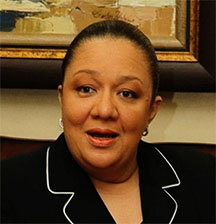PORT-AU-PRINCE, (Reuters) – Candidates from as many as 125 political parties in Haiti yesterday rushed to meet a deadline to register to run in the country’s long-overdue elections later this year.
The impoverished Caribbean island has a history of turbulent elections, but that does not appear to dissuade candidates.

By late afternoon more than 2,000 people had registered for 119 seats in the Chamber of Deputies and 20 open Senate seats, according to officials.
Lines at the electoral office in Port au Prince poured into the street during the day. The deadline to register for the Aug. 9 legislative elections was set to expire at midnight.
“Individual people are allowed to form political parties,” said Yolette Mengual, expressing a hint of resignation. Mengual, a member of the provisional electoral council that organizes the elections, said each party will be listed numerically on the ballot.
Among the last day entrants: First Lady Sophia Martelly. She waited until the final day to register her candidacy for Senate.
Haitians called in to local radio stations to question whether she is an American citizen, which would disqualify her. Like her husband, President Michel Martelly, she lived in the United States for several years before returning to Haiti.
International observers are hopeful the number of parties will decrease, producing a shorter ballot as politicians form alliances.
“A party could draw spot 126 but form a coalition with the party listed second,” Mengual said.
Mengual said the electoral council cannot force parties to form coalitions, but it is recommending them to do so.
President Michel Martelly has ruled Haiti by decree since Parliament dissolved Jan. 12 when the terms of every member of the Chamber of Deputies, and a third of the Senate expired.
The Senate had already been operating with only 20 of its 30 seats occupied because of previously missed elections, and lost its quorum after Jan. 12. The elections have been delayed by factors such as political feuding and lack of funding.
Every mayoral post in the country is up for grabs, as are neighborhood leadership positions.




